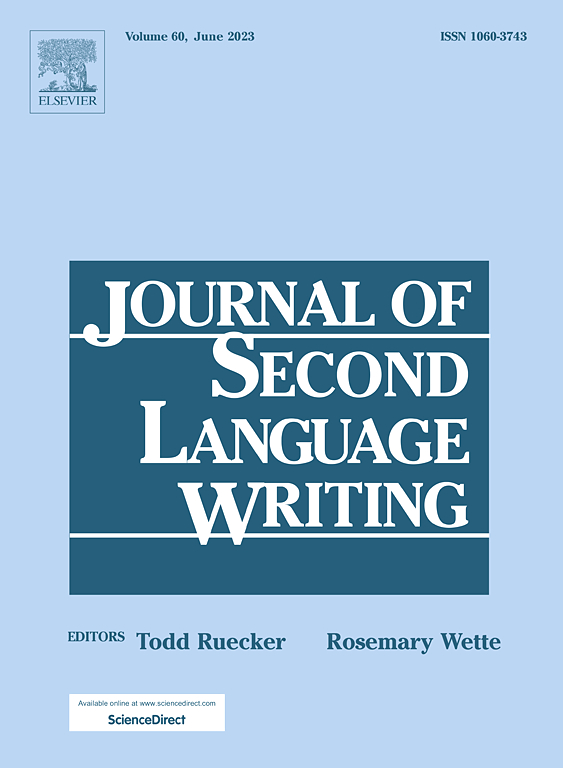Charting L2 argumentative writing: A systematic review
IF 4.5
1区 文学
Q1 LINGUISTICS
引用次数: 0
Abstract
Instilling in students the ability to argue effectively is one of the most important responsibilities of educators at any level. This may be why so much focus is put on the quality of reasoning in schools and universities both in L1 and L2 contexts, especially when arguments appear in written form. Research conducted on L2 written argumentation has covered myriad aspects in educational contexts which calls for the need to provide a big picture view of the types of studies conducted and their associated scholars. Accordingly, in the present study, we reviewed 108 articles on L2 argumentative writing research from 2003 to 2023 adopting a synthetic approach to investigate the impact of theoretical orientations, research methodology, and the main topics of interest. The findings revealed L2 written argumentation has gathered global interest across all educational levels. Primary topic focuses were on language usage, pedagogy, and assessment, while there was less interest in the actual quality of the argumentative content. The most frequently used theoretical frameworks were theories related to modified Toulmin models, cognition, society and culture (i.e., sociocultural theory), linguistic complexity, and genre. Research methodologies were mostly quantitative. Implications and recommendations for those working on L2 argumentative writing are discussed.
图表L2议论文写作:系统回顾
向学生灌输有效辩论的能力是各级教育工作者最重要的职责之一。这可能就是为什么在学校和大学里,无论是在第一语言还是第二语言语境中,推理的质量都受到如此多的关注,尤其是当论点以书面形式出现时。对第二语言书面论证的研究涵盖了教育背景下的无数方面,这就需要对所进行的研究类型及其相关学者提供一个大的视角。因此,在本研究中,我们回顾了2003年至2023年间关于第二语言议论文写作研究的108篇文章,采用综合方法来研究理论取向、研究方法和主要兴趣主题的影响。研究结果显示,第二语言的书面论证已经引起了全球所有教育水平的兴趣。主要的主题集中在语言使用、教学法和评估上,而对议论文内容的实际质量兴趣较少。最常用的理论框架是与修正的图尔敏模型、认知、社会和文化(即社会文化理论)、语言复杂性和类型相关的理论。研究方法主要是定量的。讨论了对第二语言议论文写作的启示和建议。
本文章由计算机程序翻译,如有差异,请以英文原文为准。
求助全文
约1分钟内获得全文
求助全文
来源期刊

Journal of Second Language Writing
LINGUISTICS-
CiteScore
8.80
自引率
13.10%
发文量
50
审稿时长
59 days
期刊介绍:
The Journal of Second Language Writing is devoted to publishing theoretically grounded reports of research and discussions that represent a significant contribution to current understandings of central issues in second and foreign language writing and writing instruction. Some areas of interest are personal characteristics and attitudes of L2 writers, L2 writers'' composing processes, features of L2 writers'' texts, readers'' responses to L2 writing, assessment/evaluation of L2 writing, contexts (cultural, social, political, institutional) for L2 writing, and any other topic clearly relevant to L2 writing theory, research, or instruction.
 求助内容:
求助内容: 应助结果提醒方式:
应助结果提醒方式:


